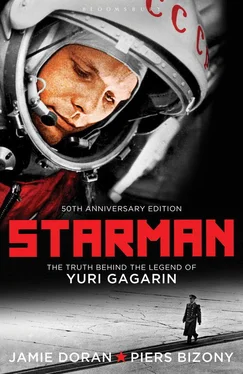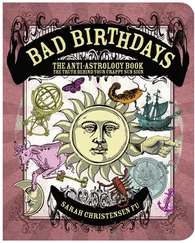Of course Nikolai Kamanin was severely criticized for his failure of supervision at Foros. At a special meeting in Star City on November 14 he had to explain Titov’s and Gagarin’s behaviour in the best possible light:
Gagarin and Titov described their behaviour in the health resort adequately on the whole. They acknowledged their alcohol abuse, thoughtless attitude to women and other faults. However, probably for Valya’s peace of mind, Gagarin maintained that he did not know the girl was in the room from which he jumped.
Kamanin persuaded the meeting to judge that his adulterous First Cosmonaut had merely been teasing his wife in a childish hide-and-seek game, while his drunken understudy Titov had been led astray by non-cosmonaut companions. Everyone knew that these were white lies, but tidy official versions were agreed, with the help of hand-written notes of apology from the cosmonauts themselves. Kamanin noted, ‘I’m sure Gagarin had a different motive for visiting that room, but I won’t press the matter, in case it causes discord in his family.’
Kamanin was lenient, but during the December resumption of Gagarin’s world tour, he found to his great frustration that the First Cosmonaut’s behaviour still was not improving. On December 14 he wrote in his diary:
He hasn’t given up drinking, even after the Crimean incident. I don’t fancy being a prophet of doom, but it seems to me he’s drinking a good deal. He’s at the top of his glory, bearing a great moral burden, knowing that his every step is being watched. One or two years will pass, the situation will change drastically, and he will become dissatisfied. It’s obvious in his family life even now. He has no respect for his wife, he humiliates her sometimes, and she doesn’t have the advantages of education or the social skills to influence him.
He also observed that ‘Titov, recently returned from his tour of Indonesia, is starting to think no small beer of himself.’ Evidently Kamanin felt that he had another wayward cosmonaut on his hands. But one has to keep in mind that his personal diaries are private expressions of annoyance, as much as accurate historical records. There is scarcely a single person within the Soviet space effort (not even the great Chief Designer) whom he does not criticize at some point – often unfairly – and just as often prior to a complete reversal of opinion a few days later. Even Khrushchev comes in for flak. Perhaps Kamanin’s administrative tensions after the Foros incident can explain an extraordinary outburst of contempt in his diary about the Party Congress – the one at which Gagarin’s muted appearance had caused so much embarrassment. At the Congress Nikita Khrushchev had proposed that Joseph Stalin’s body be removed from the Mausoleum in Red Square. On November 5, 1961 Kamanin raged:
Many people disapprove of this. They speak about it openly in buses, on the metro and on the streets. The destruction of Stalin’s prestige creates many problems. The young are losing their faith in authority… Stalin ruled the country for thirty years and turned it into a mighty state. His name can never be eclipsed by the pathetic pretensions of pygmies. Khrushchev is an envious intriguer, a cowardly toady. Everyone knows about his total diplomatic failures with China, Albania, the USA, France, England, and so on.
The irony is that no one in Stalin’s time would have dared put such words on paper, for fear of being found out and shot. It can be assumed that Khrushchev’s officials blamed Kamanin for not keeping his cosmonauts in order, so he vented his feelings in the pages of his diary; but he was not alone in his political opinions. It is hard for Westerners to understand the extent to which Stalin’s memory was revered. Kamanin may have had a variety of reasons for his bitterness in October 1961, but he was broadly correct in his assessment. First Secretary Nikita Khrushchev was heading for a fall, and so was Yuri Gagarin.
By December 1961 the world tour had resumed, with Gagarin’s slight scar carefully disguised by make-up. Delhi, Lucknow, Bombay, Calcutta, Colombo, Kabul, Cairo… Onwards, ever onwards. During the Ceylon visit, Gagarin carried out fifteen separate speaking engagements in one day. In Cairo a newspaper announced that he was nominated for election to the Supreme Soviet as a representative of the Smolensk region. [4] A wall chart at Star City commemorates the dates and destinations of all Gagarin’s trips. All countries are named, except for the US. Gagarin made a very brief visit to New York on October 16, 1963, but the wall chart refers instead to the ‘United Nations’. Gagarin was a guest speaker in the UN complex, and was not formally invited by the US itself.
Athens, Nicosia, Tokyo – and a loaded question about toys. A Japanese journalist wanted to know why Gagarin had bought a load of Japanese stuffed toys for his children. Could it be that Russian toys were not available back home? Gagarin replied, ‘I always bring presents back for my daughters. I wanted to surprise them this time with Japanese dolls, but now this story will be all over the newspapers and it’ll take away their surprise. You’ve spoilt a joy for two small girls.’ He made this speech with the most charming smile and the questioner conceded defeat. The other journalists in the room buzzed their approval. Game point to Gagarin.
Valya came along on this leg of the tour, but it was not easy to combine foreign trips with childcare. She preferred to stay at home in Moscow while her husband travelled. She was shy, and found her occasional public appearances very difficult. This was not the life she had expected.
Fyodor Dyemchuk drove Valya around while Gagarin was abroad. He could hardly fail to notice her intense dislike of publicity. If her occasional foreign trips were a strain, then the streets and shops of Moscow were no less of a burden to her. Dyemchuk escorted her during household shopping trips, and Valya would always take her place in the inevitable queues like an ordinary Muscovite, but the other women in the line usually recognized her straight away. ‘She would immediately turn around, get back in the car and say, “Let’s go. They recognized me.” Everyone would tell her to come to the front of the queue, but she would modestly come back to the car and go to a different shop.’
Nikolai Kamanin accompanied Gagarin on several more foreign trips. On December 4, 1961, during the visit to India, he wrote in his diary:
Thousands of people greeted Gagarin warmly. I was reminded of my naïve childhood impressions of Christ meeting his people. He needed a miracle with five thousand loaves and fishes, but our Gagarin satisfies the people’s thirst by his appearance alone. I’m the one writing these words, although I know better than anyone that Gagarin happens to be here only by sheer luck. His place could easily have been occupied by someone else. I remember writing on April 11 [the day before the space flight], ‘Tomorrow Gagarin will become famous worldwide’, but I could never have predicted the scale of his glamour.
By December 9, Gagarin, Valya and the accompanying entourage were in Colombo, Ceylon. Gagarin told Kamanin that he was ‘close to wearing out’. The Soviet ambassador in Colombo insisted on his making as many appearances as possible. Kamanin could not help but note:
They are doing their best to squeeze the maximum possible use out of Gagarin to make the government look good. They have no interest in how all this affects him.
By now Kamanin was growing concerned about Gagarin’s alcohol abuse and Valya’s increasing inability to deal with the stress of public appearances. Kamanin, Golovanov and other close colleagues have a similar view about this. It seems that Gagarin was a sensible drinker, a fun-loving man who could get drunk with the best of them but seldom drank too much when working. Unfortunately the publicity tours placed him in social situations where he was expected to drink each and every time, so as not to snub the endless toasts made in his honour. This, coupled with the emotional strain of his remorseless public schedule, inadvertently led him towards excessive drinking. Gagarin’s personal KGB escorts and speech advisors, Venyamin Russayev and Alexei Belikov, were criticized for allowing this state of affairs to occur, although there was little they could do to prevent it.
Читать дальше












